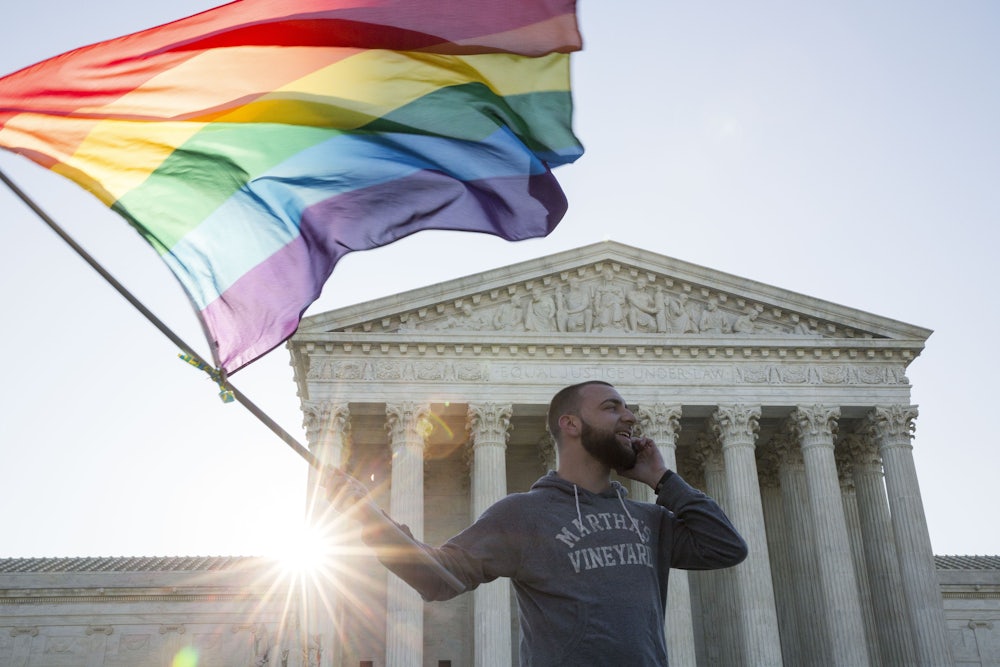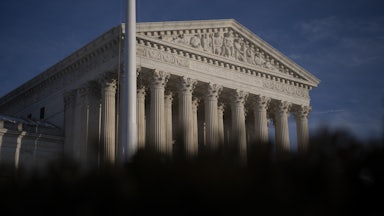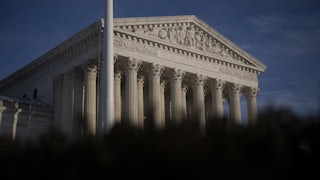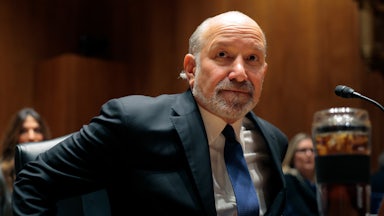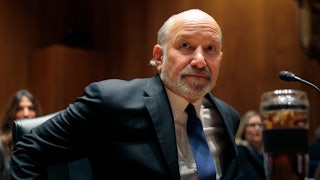A large number of major news outlets reported earlier this week that the Supreme Court was asked to take up a case where it could overturn Obergefell v. Hodges, the landmark 2015 decision that struck down same-sex marriage bans across the country. Their collective reporting gave the impression that Obergefell was in imminent danger.
Some degree of trepidation is warranted. It is certainly possible that the Supreme Court, in its current composition, overturns Obergefell at some point in the future. Today’s 6–3 conservative majority is much more reactionary and hostile to judicial precedent than the 5–4 court that decided the 2015 case. Three of the four justices who dissented from it are still on the court. That said, there is also good reason to doubt that, if the court does overturn Obergefell, this particular case will be the one in which they do it.
The petition for review, which is titled Davis v. Ermold, comes from Kim Davis, a former Kentucky county clerk who refused to sign marriage licenses for gay and lesbian couples in 2015 after the Obergefell decision. On the other side are David Ermold and David Moore, a same-sex couple who lived in Kentucky at the time.
Ten days after the Obergefell decision, Ermold and Moore sought legal recognition for their 18-year-long relationship by obtaining a marriage license from the Rowan County clerk’s office. Davis told them that she would not issue one because she was acting “under God’s authority.” According to court filings, when the two men pointed out that she had given marriage licenses to “murderer[s], rapists, and people who have done all kinds of horrible things,” Davis responded that “that was fine because they were straight.”
Ermold and Moore sued Davis for damages under Section 1983, a Reconstruction-era provision in federal law that allows people to sue state and local officials in federal court for violating their federal constitutional rights. In a separate case, a group of plaintiffs had sued Davis for denying marriage licenses and asked a federal judge to order her to grant them. Davis defied the court order and continued to refuse to issue licenses—including to Ermold and Moore when they revisited the clerk’s office after the court order.
After Davis spent five days in jail for contempt of court, the clerk’s office began issuing modified marriage licenses under her authority. Ermold and Moore successfully obtained one during that period. The state legislature ratified those ad hoc modifications by allowing county clerks to issue licenses without the clerk’s name and signature in some circumstances, apparently satisfying Davis’s religious concerns. She eventually left office in 2019 when her term expired.
Those changes did not resolve Ermold and Moore’s damages lawsuit, however. Davis initially sought to invoke qualified immunity to defeat the lawsuit. Qualified immunity shields state and local officials from Section 1983 claims unless the plaintiffs can prove that the defendant violated a “clearly established right” at the time. This is most commonly seen in police brutality cases, but it technically protects any state or local official acting under color of law.
Qualified immunity is often a tricky barrier for plaintiffs to overcome since lower courts usually interpret what counts as a “clearly established right” as narrowly as possible. That wasn’t a problem in this case because Davis was effectively and unambiguously defying a recent Supreme Court ruling. “For a reasonable official, Obergefell left no uncertainty,” the Sixth Circuit Court of Appeals noted in its ruling on her immunity claim. But for Davis, the panel quipped, “the message apparently didn’t get through.”
Davis also invoked the First Amendment’s free exercise clause and Kentucky’s state-law version of the Religious Freedom Restoration Act. Those defenses also failed because Davis was acting as a government official at the time. A federal district court said in response that it could find no precedent, nor did Davis cite one, “where a defendant’s constitutional rights were found to be a valid defense for violating the constitutional rights of others.” The court ultimately awarded $100,000 in compensatory damages to the two men for their troubles.
In response, Davis again appealed the district court’s ruling, where she was met by an unsympathetic Sixth Circuit once more. “As Davis sees it, a public official can wield the authority of the state to violate the constitutional rights of citizens if the official believes she is ‘follow[ing] her conscience,’” the panel wrote when denying her appeal in March. “That cannot be correct.” Her defeat at the Sixth Circuit set the stage for her appeal to the Supreme Court.
Much of the coverage of Davis’s petition for review made note of the fact that she asked the Supreme Court to overturn Obergefell. That is not necessarily remarkable on its own. The high court receives thousands of petitions every year that ask it to do all sorts of things. It only takes up about 60 to 80 of them. Beyond the statistical unlikelihood, there are additional reasons why it is highly doubtful the court will take up this case.
First, there is no actual reason for the court to overturn Obergefell here. By that I don’t simply mean that it would be wrong or unjust for it to do so. I mean that it would be completely unnecessary to resolve Davis’s petition. Litigants are required to present questions for the court to resolve, and Davis gave three of them.
One is whether the free exercise clause “provides an affirmative defense to tort liability based solely on emotional distress damages with no actual damages,” while the other is whether she can raise free speech defenses for her actions when she is sued in her personal capacity, as she was here. Only in her third question does she ask the court to decide “whether Obergefell v. Hodges, and the legal fiction of substantive due process, should be overturned.”
The court’s general practice is to resolve cases with multiple questions in the most straightforward and least disruptive way possible. If the justices were to take up this case and decide that Davis could raise free exercise clause defenses, for example, then it would be unnecessary to resolve the other questions until the lower courts reconsider their earlier rulings. The court sometimes jumps ahead to resolve other questions—last year’s ruling in the Trump disqualification case is a great example—but it usually does not.
Second, if the court really does want to overturn Obergefell, this case is also an objectively poor vehicle to do it. Appellate judges and lawyers use the term “vehicle” to refer to cases that bring a specific legal question before the court. Like most car buyers, the justices prefer their vehicles to be clean and low-mileage. They typically avoid cases with unrelated procedural issues or complicated factual problems when handing down major constitutional rulings. Much of the anti-abortion litigation in the late 2010s and early 2020s, for example, centered around finding the least complicated case possible for the conservative justices to overturn Roe.
Davis’s petition does not really explain why overturning Obergefell is necessary to resolve her case. It simply quotes at length from the conservative justices who criticized the ruling and said the ruling should be overturned because it is burdensome to people with religious beliefs, including Davis. I would not call it half-hearted because it is clearly an important position for her and her lawyers, but it is not the central thrust of her legal arguments to the court.
The only way that Obergefell is actually relevant to the outcome of Davis’s case is if the Supreme Court says that she is entitled to qualified immunity because the right to marriage for same-sex couples wasn’t a “clearly established right” at the time because Obergefell was wrongly decided. My faith in the justices is fairly weak these days, but even I don’t think they would do that. Not only would the court effectively be rewarding a litigant for ignoring a Supreme Court ruling in the first place, but it would also blow up the court’s qualified immunity jurisprudence along the way. How could lower courts determine what rights are “clearly established” if they can’t even reliably use Supreme Court rulings to do it?
Third, this is not the first time that Davis has asked the Supreme Court to intervene in her legal troubles. Five years ago, she urged the justices to restore her qualified immunity defense after the Sixth Circuit agreed with the district court that it did not apply in this case. The court rejected her petition in the first batch of orders at the start of its 2020–2021 term. The justices do not provide explanations for why they reject petitions, partly for pragmatic reasons (the additional workload would be crushing) and partly to avoid any impression that they either agree or disagree with the lower courts’ rulings by not reviewing them.
That said, we can infer in this particular case that the justices did not think Davis had a strong legal argument. Justice Clarence Thomas, joined by Justice Samuel Alito, wrote a “statement” on the court’s decision to deny review. He used the opportunity to fulminate against Obergefell as an “atextual” constitutional right that had demeaned “those with sincerely held religious beliefs concerning marriage.” Ultimately, Thomas concluded that Davis’s petition “implicates important questions about the scope of our decision in Obergefell, but it does not cleanly present them.”
I have little doubt that Thomas and Alito would vote to overturn Obergefell if given the opportunity. (Thomas said as much in a concurring opinion in the 2022 case Dobbs v. Jackson Women’s Health Organization, where the conservative majority overturned Roe v. Wade, but he does stuff like that all the time.) His use of a “statement” rather than a dissent signals that he voted against taking up Davis’s case in that stage of the litigation. In short, this is a petitioner whose arguments have already failed to persuade the justices who are most inclined to be sympathetic to her position.
So why did Davis bother asking the court to overturn Obergefell at all? That’s a good question. In the past, conservative litigants have sometimes narrowed the scope of their questions for the justices for strategic reasons. Perhaps the most famous recent example was Dobbs itself. When the state of Mississippi first asked the court to review a challenge to its 15-week abortion ban in the spring of 2020, it told the justices that its questions presented “do not require the court to overturn Roe or Casey.” Only after the death of Ruth Bader Ginsburg and the confirmation of Amy Coney Barrett did it change tack and demand Roe’s demise.
Finally, I am not so sure that the Supreme Court actually wants to overturn Obergefell at all. Some of the court’s members do, of course. Thomas has more or less said outright that he would vote to overturn it, and Alito would likely agree with him. (I assume that neither Justice Sonia Sotomayor nor Justice Elena Kagan has changed her mind on marriage equality in the last 10 years, and I would also be stunned if Justice Ketanji Brown Jackson thought Obergefell was wrongly decided.) At the same time, it also seems unlikely that Roberts would join with Thomas and Alito, even though he dissented alongside them 10 years ago.
In 2020, Roberts voted with the court’s liberals to strike down an anti-abortion law in Louisiana, even though he had unsuccessfully voted with the conservatives to uphold a nearly identical law in Texas a few years earlier, on stare decisis grounds. In Dobbs, he also chastised his colleagues for going out of their way to overturn Roe instead of choosing a narrower path and did not technically join their decision except on the fate of the Mississippi law itself. “The Court’s opinion is thoughtful and thorough, but those virtues cannot compensate for the fact that its dramatic and consequential ruling is unnecessary to decide the case before us,” he wrote.
As for the three remaining conservatives, it’s more complicated and less clear. None of them have signaled an interest in overturning it since joining the court. Justice Neil Gorsuch joined with Thomas and Alito in a post-Obergefell summary judgment case on birth certificates, but his main issue wasn’t with Obergefell itself but with how the majority approached the case on a procedural level. Gorsuch also wrote the court’s landmark decision in Bostock v. Clayton County, where the court held that Title VII’s workplace-discrimination protections covered sexual orientation and gender identity. That doesn’t mean that he wouldn’t vote to overturn Obergefell, of course, but that vote makes it much harder to suggest that he definitely would.
There are even fewer signs that Kavanaugh or Barrett is interested in doing so, which is telling in and of itself. Overturning Roe was also the product of a half-century of activism and advocacy by the conservative legal movement. The justices who voted to overturn Roe sent ample signals about their intent to do so in advance. It was part of the reason that they got the job, along with their disdain for federal regulatory agencies and their commitment to Robertsian color blindness on race.
There is no comparable legal or political campaign to pressure the justices at the moment to overturn Obergefell. Eighty-eight percent of Americans said that they support marriage equality in a Gallup poll earlier this year. Leonard Leo, the éminence grise of the conservative legal movement, recently suggested that the matter was closed for now. “Is gay marriage settled law?” Bari Weiss asked him in an interview earlier this year. “Yes, probably,” Leo replied.
Part of the reason for this reluctance may be that the conservatives can achieve their stated goals through other means. Alito, writing in dissent in Obergefell, claimed that the ruling would be “used to vilify Americans who are unwilling to assent to the new orthodoxy.” To that end, the court has gone to great lengths to insulate Americans with “traditional marriage beliefs” from anti-discrimination laws and to prevent them from being treated as “social outcasts.” Some of the court’s conservative justices may prefer containing Obergefell’s impact on social conservatives to overturning the ruling, especially given the legal chaos that would follow from imperiling the validity of, by some counts, more than 700,000 marriages.
That said, it is understandable that the fear remains. The Roberts court’s post-Kennedy record on LGBT rights is mixed at best and only getting worse; the justices will even take up a challenge to state laws that ban conversion therapy next term. While it is unlikely that the justices will take up Davis v. Ermold in any form, let alone to overturn Obergefell, it may serve as a straw poll of sorts to see where the justices stand on the matter. If any of the other conservatives join Thomas and Alito in using the Davis case to call for Obergefell’s demise, then it will be time for alarm.
